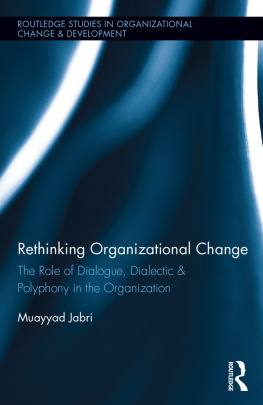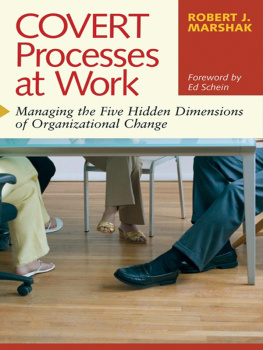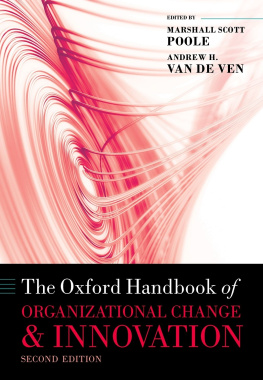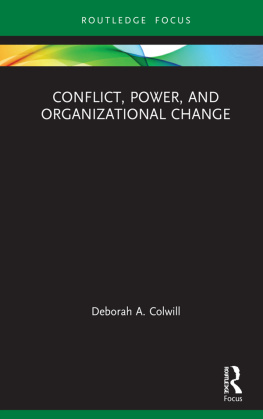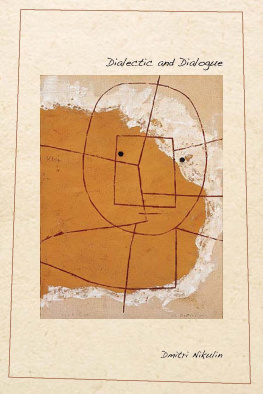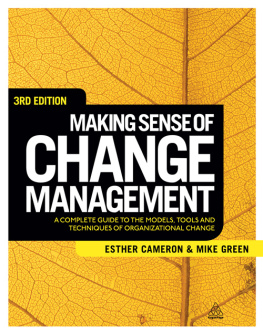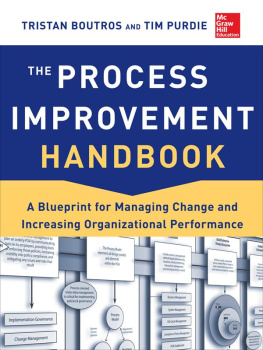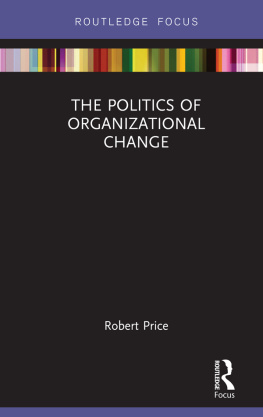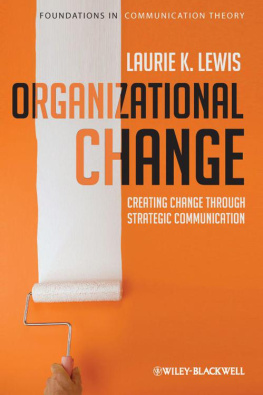Rethinking Organizational Change
Muayyad Jabri has written an interesting and important review which explores polyphony as a significant concept in the generation and understanding of meaning in everyday converse. Students and practicing managers alike will find this a fascinating and insightful read.
Julian Randall, University of Aberdeen, UK
This is a must-read for those in the field of change management that want to develop a relational dialogue approach. Rethinking Organizational Change is well written and can help scholars and managers alike.
David Boje, New Mexico State University, USA
Rethinking Organizational Change: The Role of Dialogue, Dialectic & Polyphony in the Organization makes an important scholarly contribution to our understanding of dialogue applied to the management of change. Muayyad Jabri offers an involved assessment of the differences between dialogue and dialectic and an intriguing invitation to rely on both for managing creative interventions into the change process. The book provides a surplus of new insights that will help to promote scholarly work in the area of managing change and to develop a more creative practice associated with the processes of managing change.
The call for polyphony facilitates a crossover from sameness to diversity and from univocal to multivocal representations. In reading patterns of managing change, whether from within or across organizational borders, it is found that a vital part of the reading is, at present, unreadable because we lack involved knowledge of how diversity and polyphony are interrelated. This book seeks to change this; based on a rendition of Mikhail Bakhtins anthropological concept of polyphony applied to organizational change. The reader is treated to a cutting-edge discussion of a variety of contemporary ontological and epistemological themes centered on process, dialectic, dialogue and social construction.
Muayyad Jabri is an Associate Professor at the Graduate School of Business University of New England Business School, Australia.
Routledge Studies in Organizational Change & Development
1Organizational Change for Corporate Sustainability 3rd Edition
Suzanne Benn, Dexter Dunphy, Andrew Griffiths
2Organizational Change, Leadership and Ethics
Leading Organizations Toward Sustainability
Edited by Rune Todnem By, Bernard Burnes
3Managing Organizational Change in Public Services
International Issues, Challenges and Cases
Edited by Rune Todnem By, Calum Macleod
4Organizational Change for Corporate Sustainability
A Guide for Leaders and Change Agents of the Future, 2nd Edition
Suzanne Benn, Dexter Dunphy, Andrew Griffiths
5The Sustainability and Spread of Organizational Change
Modernizing Healthcare
Edited by David A. Buchanan, Louise Fitzgerald, Diane Ketley
6Agency and Change
Rethinking Change Agency in Organizations
Raymond Caldwell
7Reshaping Change
A Processual Perspective
Patrick Dawson
8Organizational Change for Corporate Sustainability
A Guide for Leaders and Change Agents of the Future
Suzanne Benn, Dexter Dunphy, Andrew Griffiths, Suzanne Benn, Dexter Dunphy, Andrew Griffiths
9Change Competence
Implementing Effective Change
Steven ten Have, Wouter ten Have, Anne-Bregje Huijsmans & Niels van der Eng
10Organizational Change and Global Standardization
Solutions to Standards and Norms Overwhelming Organizations
David M. Boje
11Organizational Development and Change Theory
Managing Fractal Organizing Processes
Tonya L. Henderson and David M. Boje
12The Leadership of Organizational Change
Mark Hughes
13Perspectives on Change
What Academics, Consultants and Managers Really Think About Change serpla
Edited by Bernard Burnes and Julian Randall
14Rethinking Organizational Change
The Role of Dialogue, Dialectic & Polyphony in the Organization
Muayyad Jabri
Rethinking Organizational Change
The Role of Dialogue, Dialectic & Polyphony in the Organization
Muayyad Jabri

First published 2016
by Routledge
711 Third Avenue, New York, NY 10017
and by Routledge
2 Park Square, Milton Park, Abingdon, Oxon OX14 4RN
Routledge is an imprint of the Taylor & Francis Group, an informa business
2016 Taylor & Francis
The right of Muayyad Jabri to be identified as author of this work has been asserted by him in accordance with sections 77 and 78 of the Copyright, Designs and Patents Act 1988.
All rights reserved. No part of this book may be reprinted or reproduced or utilized in any form or by any electronic, mechanical, or other means, now known or hereafter invented, including photocopying and recording, or in any information storage or retrieval system, without permission in writing from the publishers.
Trademark notice: Product or corporate names may be trademarks or registered trademarks, and are used only for identification and explanation without intent to infringe.
Library of Congress Cataloging-in-Publication Data
Names: Jabri, Muayyad, author.
Title: Rethinking organizational change : the role of dialogue, dialectic &
polyphony in the organization / by Muayyad Jabri.
Description: New York : Routledge, 2016. | Includes bibliographical
references and index.
Identifiers: LCCN 2015035948 | ISBN 9781138837928 (cloth : alk. paper) |
ISBN 9781315734774 (ebook)
Subjects: LCSH: Organizational changeManagement. | Communication in
organizations.
Classification: LCC HD58.8 .J3273 2016 | DDC 658.4/06dc23
LC record available at http://lccn.loc.gov/2015035948
ISBN: 978-1-138-83792-8 (hbk)
ISBN: 978-1-315-73477-4 (ebk)
Typeset in Sabon
by Apex CoVantage, LLC
For Wendy, Nadia, Estefan, and Joseph
Contents
Table
Figures
This book is based on a rendition of Mikhail Bakhtins anthropological concept of polyphony applied to organizational change. The reader is treated to a cutting-edge discussion of a variety of contemporary themes centered on process, dialectic, dialogue, and plasticity. Why Bakhtin? Bakhtins thought is a source of inspiration. His notion of utterance and his distinction between monologue and dialogue have an important role to play in the face of the monologues of managerialism and the rigidity of dialectics. This books title therefore mentions rethinking polyphony because it enacts and maintains that polyphony, applied to organizational settings, means multiple voices that are unmerged into a single or unified perspective.
I think the scholarly concept of this book began when I first came across the work of Mikhail Bakhtin, some years back. Bakhtin greatly valued the existence of others. As the title of this bookRethinking Organizational Change: The Role of Dialogue, Dialectic & Polyphonysuggests, Bakhtin was careful to distinguish between language as a self-constrained system, which he identified as a codification, and a feeling for utterance. The former is centered on a Cartesian separation. It is about positing the self against objectifying truth and upon much of the ideology on which managerialism is based. A feeling for utterance is Socratess notion that we all contribute to forming each others sense of truth.

